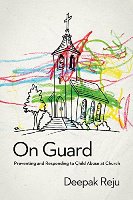Today we continue our interview with Pastor Deepak Reju, as he talks to us about his important new book, On Guard: Preventing and Responding to Child Abuse. If you missed part 1 of this interview yesterday, you can catch up here.
Books At a Glance (Fred Zaspel):
You mention that the local church can be an easy target for a predator. Perhaps it would be good for us to hear why that is so.
Reju:
Consider a few reasons…
Christians are naïve. Because Christians are generally trusting folks, and sexual abusers know this fact, an offender will take advantage of a churchgoer’s trust.
Christians are ignorant. Because Christians don’t know the extent of the problem, they often don’t guard against it. And this makes children vulnerable.
Abuse of authority. Child abusers will use positions of authority to gain access to children and abuse them. In the case of one child abuser, he would show up at churches and volunteer to be the children’s choir director after the church got to know him. Sadly, he was not just able to do this once, but several times.
Easy access to children. Sexual offenders take advantage of the fact that churches are always looking for help with children’s ministry and are often facing shortages of volunteers. They know the children’s ministry staff are over-worked and desperate for help.
These are just a few reasons. There are several others I list in the book (manipulation of religious language, attitudes of invincibility, cheap grace, etc.).
 Books At a Glance:
Books At a Glance:
What are some of the most common security gaps you have seen? How do churches most frequently leave themselves unnecessarily vulnerable with regard to their children and/or teens?
Reju:
I’ve been surprised at how many churches don’t have a child protection policy or don’t use any kind of screening measures (references, criminal background checks, etc.).
The first and foremost thing that a church can do is get a good policy in place. If a church doesn’t have a policy, I’ve included in the book a lot of material on children’s ministry policies — how to write one, the principles that should undergird a good policy, etc.
In regards to screening measures, so many predators are successful because they assume that churches don’t check on their backgrounds. Unfortunately, this assumption is true. But screening is made easier for churches because there are now a number of agencies that will do parts of it for you (like the criminal background check) for a fee. Wouldn’t it be tragic for a sexual offender to abuse a child in your church, only for you to find out later that he has been tried and convicted of this offense before? You could have caught him if you had only run a criminal background check (or hired an agency to screen your volunteers for you).
On screening measures, do know that if you have volunteers already working for you, some of them (not all) will balk at the idea of giving over their personal information, like a social security number, in order for you to run a criminal background check. They will feel like this is getting too personal or that you somehow must not trust them. Be warned: They might even quit if you ask them to do this, and won’t see or agree with this being a reasonable measure to protect children. But don’t let this stop you — you need to have all of your volunteers screened for the safety of the children.
Books At a Glance:
Can you highlight some factors that are essential to a good policy?
Reju:
A few general principles help to keep kids safe and should typically undergird a good child protection policy.
First, the risk of abuse increases when a child is isolated with an adult. Many offenders look for privacy in order to commit abuse, so try to ensure that an adult is never isolated with children. A good policy should include guidelines like the two adult rule — at least two adults must always be present to watch the children.
Second, a policy needs to be written with your specific church in mind. If you get a sample policy from your insurance company, keep in mind the primary goal of the insurance company — to reduce liability. While that is a worthy goal, it is not your only goal in writing a policy. Or maybe you get a sample policy from another church. The worst thing you could do is just cut and paste your name into the policy. Because their church is going to be different than your church, there will be adjustments that you need to make to the policy to make it better suited for your church.
Third, a policy must actively define how your church operates. The goal of the policy is to outline the parameters for a safe environment for the children. If no one pays attention to your policy then it is doing you no good. In fact, if you have a policy, and you don’t follow it and someone gets abused, it will be worse off for you! So make sure your policy matches with what your church is actually doing.
Books At a Glance:
Okay, say a church recognizes the need to step up in this regard and be more proactive. What are the most important steps to get started … and then to make sure it is responsibly maintained? In our own case, we will ask our deacons to read your book and follow up with a plan. Is there other general advice you can give?
 Reju:
Reju:
To start with, make sure the leadership is “on board” with whatever plan you implement. You’ll need their backing as some people may resist the plan later on. Then make sure you educate and equip the staff or key volunteers on the children’s ministry team. If they sign on then they can be your advocates as you engage the congregation.
Before you write a policy and implement it, you should also educate and equip the congregation. Help your fellow church members to understand the problem, the needs and how to prevent and respond to abuse. A little knowledge can go a long way in helping your church members to know how your church needs to be more proactive.
Once you’ve taken time to educate and equip these three groups (leadership, children’s ministry team, and the congregation) then you are ready to write a policy. Collect examples of other policies (we’ve got a few of our favorites posted on our website). Commission someone to read and write a first draft. Then get a group of folks in different categories (church leadership, lawyers, doctors, parents, etc.) to read the drafted policy and provide feedback.
You then need to implement what has been written in your child protection policy. Pick a starting date and equip the current volunteers to know what to do. At some point, you’ll want to evaluate how things are going and make adjustments so that your policy and practice line up with each other.
I’ve got a number of strategies traced out in the book (check-in and check-out processes; training of leadership and volunteers; etc.), including how to respond to abuse if it happens in your church.

